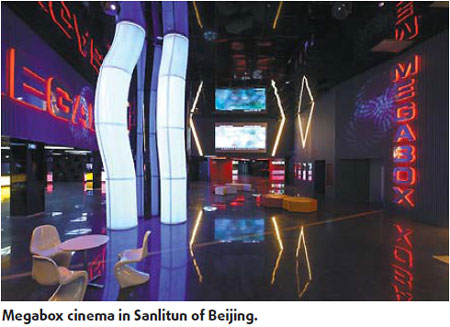


From producing movie blockbusters, to making red-hot TV sitcoms like Soldiers Sortie (Shibing Tuji), and from producing music to talent management, Wang Zhongju and his brother have always challenged themselves.
Now they have a more ambitious plan - building movie theatres in the world's most populated country where pirated DVDs and free-of-charge Internet downloads are rampant.
Huayi Brothers are now building movie theaters in large cities including Beijing, Shanghai, Chongqing, and Tianjin and two are expected to open by the end of this year. The company also plans to acquire existing movie theatres to expand its network.
"Cinemas are a very important link in the film industry. China still does not have enough high-quality movie screens," says Wang Zhongjun, chairman of Huayi Brothers.
"Although you can easily find pirate DVD hawkers in the streets, you can also see long queues in high-end cinemas in large cities, waiting to get a ticket to a blockbuster movie," Wang says.
Every year about 300 to 400 new movie screens are set up in China and the country now has more than 3,000 screens with a population of 13 billion. But with a population of only 200 million, the United States has over 30,000 screens.
"That means a huge potential in China," Wang says.
He is not alone.
Wanda Group may be the most aggressive domestic company trying to weave a cinema network in China.
The Dalian-based real estate developer vowed in 2003 to equip all of its Wanda Squares in China with its own movie theaters. Now the company owns 29 cinemas and plans to add 15 new theaters every year. It is expected to launch its 300th movie screen by the end of this year. In fact in cities like Tianjin, Wuhan and Nanning, Wanda Cinemas' box office revenues have exceeded the combined revenues of existing theaters.
Foreign investors are also testing the waters.
Megabox Cineplex, one of South Korea's largest cinema operators, opened its first joint venture cinema in the Zhongguancun area in Beijing last year and the second in Sanlitun in the capital city in July. It plans to open the third in 2010 in Shenyang, Liaoning province.
"The Chinese government is developing a system on film production, distribution and IPR protection. It takes time, but it is already going in that direction. If you wait until everything is completely ready, you will miss the chance, probably forever," says Qiu Hongtao, deputy general manager of Megabox Cineplex China.
But some come, some go. Not every foreign investor is accustomed to the Chinese situation.
Entertainment giant Warner Brothers International, which opened its first joint venture cinema in China in 2002, pulled out of the country at the end of 2006. The company had operated six cinemas with local partners and had planned to expand that to about 30.
Earlier media reports said the company withdrew from China because the government tightened restrictions on foreign investors and it could not negotiate a compromise.
The government announced a policy in 2005 that requires mainland companies to own at least 51 percent in their joint ventures with foreign investors. The rule is a drastic change from a 2003 regulation that opened seven Chinese cities to majority overseas investment of up to 75 percent of a cinema on a trial basis.
Some industry insiders say it was also because Warner Brothers' management style did not fit with the Chinese style.
Qiu says a big challenge facing cinema operators in China is the enormous initial investment.
"Although a good cinema can ensure a stable cash flow when it starts operation, it involves huge investments and it takes several years to get a return," says Qiu, adding that the rising commercial real estate prices in China have also made the problem more serious.
Another challenge is the shortage of talent because there are few professional movie theater operators in China, Qiu says.
(China Daily 11/24/2008 page12)













